GE boosts outlook despite 737 Max, tariff headwinds
General Electric reported strong third-quarter results and raised its outlook for the remainder of the year, sending shares higher before the opening bell.
The conglomerate reported adjusted earnings of 15 cents a share on revenue of $23.4 billion, topping the 11 cents and $22.9 billion that analysts surveyed by Refinitiv were expecting.
GET FOX BUSINESS ON THE GO BY CLICKING HERE
“Our results reflect another quarter of progress in the transformation of GE,” CEO Lawrence Culp said.
| Ticker | Security | Last | Change | Change % |
|---|---|---|---|---|
| GE | GE AEROSPACE | 320.81 | +14.60 | +4.77% |
“We are encouraged by our strong backlog, organic growth, margin expansion, and positive cash trajectory amidst global macro uncertainty," he added. "We are raising our industrial free cash flow outlook again, even with external headwinds from the 737 MAX and tariffs.”
GE's aviation business supplies engines for Boeing's 737 MAX, the best-selling aircraft in the planemaker's history, and demand has slowed after the jetliner's global grounding following two deadly crashes.
General Electric sees full-year 2019 industrial free cash flow of $0 to $2 billion, up from its previous forecast of -$1 billion to $1 billion. For 2020 and beyond, it expects free cash flow to be positive.
The company continued to strengthen its fiscal position during the three months through September, divesting its shares in Wabtec and part of its stake in Baker Hughes, resulting in $4.6 billion of net cash proceeds.
GE also completed more than $9 billion of deleveraging and reduced debt at lending arm GE Capital by $1 billion while continuing to stabilize its power business, which took a $23 billion writedown in October 2018.
Shares rose 24.6 percent this year through Tuesday.
General Electric, once an industrial icon, is in the midst of trying to engineer a turnaround after shares lost more than half their value amid a slew of problems last year. The battered company has undertaken a massive restructuring plan aimed at reducing debt by selling off non-core assets.
In August, the company was accused by whistleblower Harry Markopolos, who alerted authorities about Bernie Madoff's Ponzi scheme, of hiding its problems through fraudulent accounting.
Including an $8.7 billion charge related to Baker Hughes, GE posted a net loss of $9.47 billion, or 15 cents a share, in the third quarter.
GE's Troubled Timeline:
2019:
- October: GE announced sweeping changes to freeze pension plans for approximately 20,000 employees beginning Jan.1, 2021, in order to reduce its pension deficit by $5 billion - $8 billion.
- June: Reports strong first-quarter results, bolstered by its aviation unit.
- March: Warns it could have a negative free cash flow of up to $2 billion this year.
- January: GE alters its agreement with the rail-transport company Wabtec to receive $2.9 billion of cash in exchange for giving up more equity.
2018:
- End of the year: GE sells a $4 billion stake in the oil-services provider Baker Hughes and announces it will sell a majority stake in the software provider ServiceMax to the private-equity firm Silver Lake. It's able to bring down debt by $21 billion in the fourth quarter.
- October: CEO John Flannery is replaced by Larry Culp after a little more than a year in the top job. The company then takes a $23 billion goodwill charge for its power business. Culp says he will sell assets to raise cash and pay down debt. The SEC and the Justice Department say they will investigate the writedown. The investigation is ongoing.
- June: GE is booted from the Dow Jones Industrial Average and announces a massive restructuring, shifting its focus to aviation, power, and renewables.




















